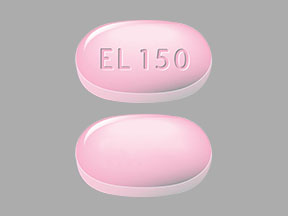Elagolix Dosage
Medically reviewed by Drugs.com. Last updated on Aug 4, 2025.
Applies to the following strengths: 150 mg; 200 mg
Usual Adult Dose for:
Additional dosage information:
Usual Adult Dose for Endometriosis
150 mg orally once a day for 24 months
For Women with Dyspareunia:
- Consider 200 mg orally twice a day for 6 months
Comments:
- Exclude pregnancy before starting or start therapy within 7 days from onset of menses.
- Use lowest effective dose, considering the severity of symptoms and treatment objectives.
- Limit the duration of use because of bone loss; for women with dyspareunia or moderate hepatic impairment, duration of use is limited to 6 months.
Use: For the management of moderate to severe pain associated with endometriosis.
Renal Dose Adjustments
No adjustment recommended
Liver Dose Adjustments
Mild hepatic impairment (Child-Pugh A): No adjustment recommended
Moderate hepatic impairment (Child-Pugh B): 150 mg orally once a day for up to 6 months
Severe hepatic impairment (Child-Pugh C): Contraindicated
Precautions
CONTRAINDICATIONS:
- Hypersensitivity to the active substance or any product ingredients
- Pregnancy
- Osteoporosis
- Severe hepatic impairment
- Concomitant use of strong organic anion transporting polypeptide (OATP) 1B1 inhibitors
Safety and efficacy have not been established in patients younger than 18 years.
Consult WARNINGS section for additional precautions
Dialysis
No adjustment recommended
Other Comments
Administration advice:
- Take orally at approximately the same time each day, with or without food
Missed dose: Take on same day as soon as remembered; Do not exceed daily dose
Storage requirements:
- Store at 36F to 86F (2C to 30C)
General:
- The effect of supplementation with calcium and vitamin D has not been studied, but supplementation is suggested due to the potential for bone loss.
Patient advice:
- Patients should be instructed to read the US FDA-approved medication guide
- Patients should understand effective non-hormonal contraceptives should be used during therapy and for 28 days after stopping therapy; pregnancy is contraindicated during use.
- Patients should understand that menstrual changes are expected during therapy.
- Patients should understand there is a risk of bone loss and adequate calcium and vitamin D intake should be encouraged.
- Patients should seek immediate medical attention for suicidal ideation and behavior; patients with new or worsening depression, anxiety, or other mood changes should seek prompt medical advice.
- Patients should be instructed to promptly report signs or symptoms of liver injury.
- Patients should be advised to dispose of unused medication via a take-back option if possible. Otherwise, follow FDA instructions for disposing of in household trash (www.fda.gov/drugdisposal); do not flush down the toilet.
Frequently asked questions
- What types of birth control work with Orilissa?
- Can Elagolix be used for heavy menstrual bleeding in women?
More about elagolix
- Check interactions
- Compare alternatives
- Reviews (131)
- Side effects
- During pregnancy
- Drug class: gonadotropin-releasing hormone antagonists
- Breastfeeding
- En español
Patient resources
Other brands
Professional resources
Other brands
Related treatment guides
See also:
Further information
Always consult your healthcare provider to ensure the information displayed on this page applies to your personal circumstances.


